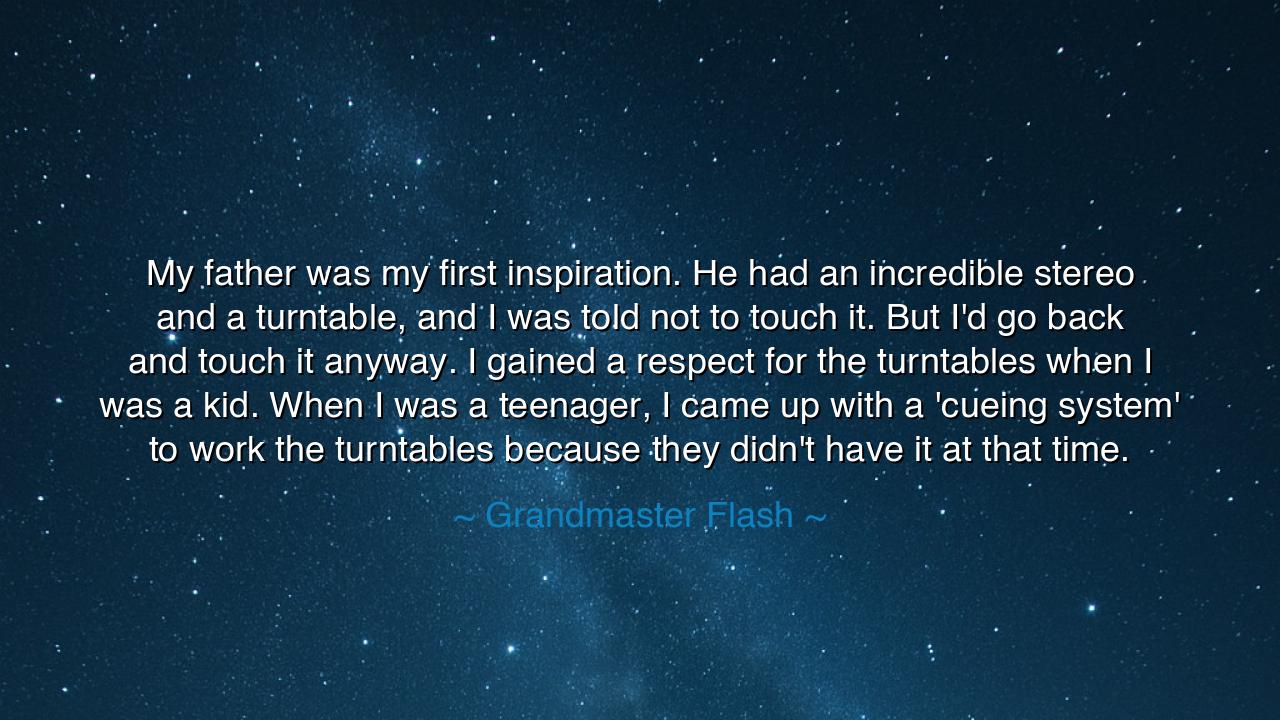
My father was my first inspiration. He had an incredible stereo
My father was my first inspiration. He had an incredible stereo and a turntable, and I was told not to touch it. But I'd go back and touch it anyway. I gained a respect for the turntables when I was a kid. When I was a teenager, I came up with a 'cueing system' to work the turntables because they didn't have it at that time.






In the words of Grandmaster Flash, the pioneer whose hands shaped the rhythm of a generation, we hear a story of curiosity, rebellion, and creation: “My father was my first inspiration. He had an incredible stereo and a turntable, and I was told not to touch it. But I’d go back and touch it anyway. I gained a respect for the turntables when I was a kid. When I was a teenager, I came up with a ‘cueing system’ to work the turntables because they didn’t have it at that time.” This quote, born from the streets and sound of the Bronx, tells not only of music, but of the eternal fire that drives human innovation — the spark that makes a child disobey in pursuit of understanding, and a dreamer turn defiance into discovery.
At its heart, this quote is about inspiration born from limits. Flash speaks of his father, the man who first surrounded him with the beauty of sound — a sacred inheritance. The father’s turntable, forbidden yet irresistible, became the young boy’s temple of learning. Though he was told not to touch it, curiosity called louder than obedience. In those small acts of rebellion, a new art was born. The very thing he was forbidden to explore became the foundation of hip-hop, a cultural force that would one day shake the world. It is a tale as old as time: that sometimes, the boundaries set before us are the stepping stones toward greatness.
In the ancient days, there were other such dreamers. Galileo, told not to look too closely at the heavens, turned his telescope toward the stars and saw a universe that defied the teachings of kings and priests. Da Vinci, forbidden to dissect the human body, did so in secret, sketching truths that would illuminate centuries of science. Like them, Grandmaster Flash broke no laws of malice — only the invisible laws of limitation. What others called defiance, he called discovery. His hands, moving upon the turntables, found rhythm where silence was expected, invention where obedience would have meant stagnation.
When Flash speaks of inventing the cueing system, he speaks of transformation through necessity. In those days, the art of DJing was still formless. The turntable was not yet an instrument, only a machine for playback. But through his ingenuity, Flash taught it to speak — to sing, to loop, to dance. With the touch of his hands, he gave birth to the modern DJ’s craft: the beat-matching, the scratching, the seamless blend of one song into another. His respect for the turntable did not mean fear — it meant understanding its power. Respect, in the truest sense, is not submission; it is mastery born from reverence.
This story carries within it the eternal truth of all creation and innovation: that those who change the world are not content to follow rules — they listen to the whisper beneath the noise. Flash’s “cueing system” was not a rebellion against his father’s command, but an extension of his father’s inspiration. The seed of his genius lay in that forbidden curiosity — the courage to touch what he was told to leave alone, and the patience to learn from every mistake. So too must all creators and thinkers walk this path: with reverence for what came before, but with the boldness to move beyond it.
In this, there lies a deeper wisdom. The child who dares to explore does not dishonor his teacher; he fulfills the teacher’s legacy. The father who guards his turntable protects what is precious — but the son who learns its secrets brings that legacy to life. Every generation must do this, for progress is not preservation alone; it is evolution. The respect Flash speaks of is not blind obedience, but the harmony between gratitude and courage — the understanding that to truly honor what we inherit, we must transform it.
So, my children, let this story be your guide: do not fear the unknown, and do not treat the tools of your time as mere objects. Treat them as instruments of your imagination. If you are told not to touch, ask why. If you are told something cannot be done, see if the world agrees — or if it merely waits for your hands to prove otherwise. The spirit of creation is both reverent and restless; it honors the past by daring to create the future.
For in the hands of Grandmaster Flash, the forbidden turntable became a voice for a generation. And through that voice, the pulse of the streets became the heartbeat of the world. His story teaches that greatness does not come from perfect obedience, but from curious respect — the kind that listens deeply, experiments bravely, and transforms limitation into sound, silence into rhythm, and the ordinary into art eternal.






AAdministratorAdministrator
Welcome, honored guests. Please leave a comment, we will respond soon